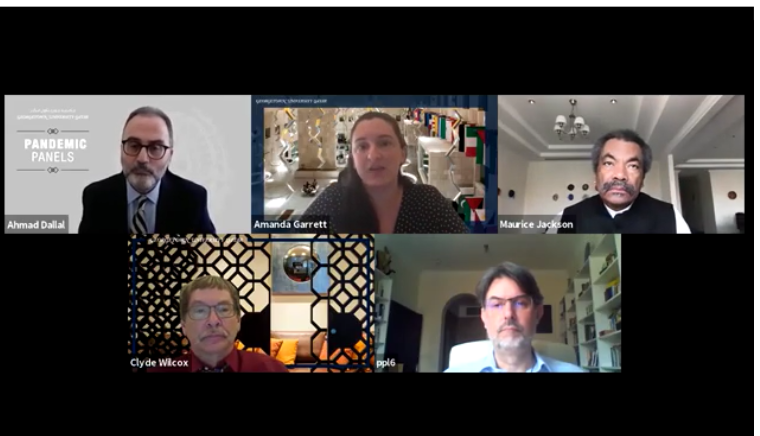At QF, Georgetown Experts Explore the Path to a Better Post Pandemic World

The pandemic will change globalization as we know it, predicts Dr. Anatol Lieven, a Professor of Government at Georgetown University in Qatar, who shared his analysis in the second installment of the university’s Pandemic Panels, a three part series of virtual discussions featuring faculty experts and hosted by the dean, Dr. Ahmad Dallal.
One of the featured experts on the second panel, titled “Global Governance in a Time of Pandemic: a Global View,” Dr. Lieven shed light on how nations are dealing with the economic challenges caused by the crisis, emphasizing that country responses would need to balance recovery with the unintended long term consequences of protectionist policies. “If we go into trade wars such as in the 1930s, we are likely to return to the economic conditions of the 1930s.”
The second panel held by GU-Q, a QF partner university continues the effort to understand the complex issues surrounding the COVID-19 crisis, in order to contribute to the construction of an evidence-based road to recovery from the pandemic. The dean, Dr. Ahmad Dallal, led the discussion on recovery efforts, polarization and isolationism, power consolidation, changes in the global order, policy decisions affecting marginalized communities, and the hope that changes might create a better future.
Assistant Professor of Political Science, Dr. Amanda Garrett, gave some examples of national responses, saying: “We’ve seen an increase in unfriendly competition between states, competition over PPE materials and resources, and some countries have banned exports.” On the other hand, she explained, “At the local level we’ve seen civil society organizations really step up and mobilize resources.”
Professor of Government, Dr. Clyde Wilcox, said one of the most important lessons of this pandemic is the urgency to better prepare for the next one. “One of the difficulties this has revealed is that the best laid plans for pandemics are often abandoned the moment you confront the reality of a particular virus. It’s going to do a lot of damage but it could get much worse the next time around.”
Part of the work of the pandemic panels is to understand how to build in resilience and understand the key issues, which according to Dean Dallal, “intersect the environment, human development and global pandemics,” to extract lessons and opportunities for charting a different path ahead. Citing the disparities in infection and death rates based on race in his home in Washington, DC, Assistant Professor of History, Dr. Maurice Jackson, said policy makers need to devise new national priorities to address the inequalities that undermine healthy societies. “National priorities must be for the health, the education, and the welfare of people.”
The GU-Q Pandemic Panels including a full list of the participating scholars are available for viewing on the university’s website.